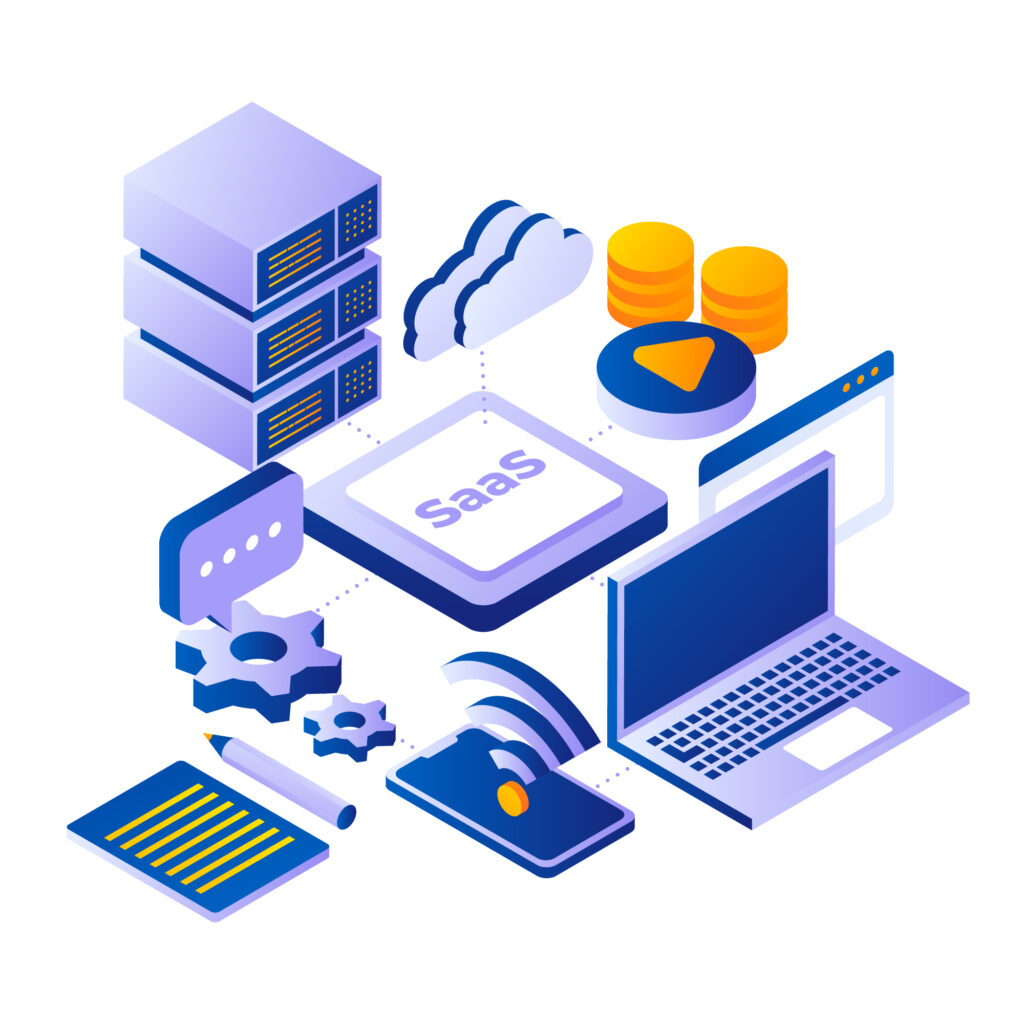B2B SaaS: Unveiling the Power of Streamlining Business Operations & Maximizing Efficiency through Cloud-Based Business-to-Business Software-as-a-Service.

Introduction
In the ever-changing business technology landscape, B2B SaaS (Business-to-Business Software as a Service) has emerged as a game-changer, providing enterprises with unprecedented potential to improve operations, boost efficiency, and drive development. This ground-breaking approach to software deployment has gained traction in recent years, transforming how businesses across industries manage their processes and cooperate with partners. In this blog, we’ll delve into the realm of B2B SaaS, investigating its features, benefits, and role in the current business ecosystem.
Understanding B2B SaaS: Redefining Business Operations
B2B SaaS, or Business-to-Business Software as a Service, is a business model in which companies supply software solutions to other companies via the Internet. This novel solution eliminates the need for businesses to invest in and manage costly on-premises software systems. Instead, businesses can use a subscription-based approach to access and use a wide range of software applications, paying just for the services they use on a regular basis. This subscription-based approach is flexible and scalable, making it an appealing alternative for businesses of all sizes.
The Power of B2B SaaS in Streamlining Operations
In today’s highly competitive corporate environment, efficiency and agility are critical. B2B SaaS is critical for streamlining operations and helping firms to respond quickly to difficulties. B2B SaaS offers a varied range of solutions geared to address the unique demands of different businesses, whether it’s managing complex supply chains, improving customer relationship management (CRM), or optimizing financial procedures.
Enhanced Collaboration and Connectivity
One of the most notable characteristics of B2B SaaS is its ability to promote cooperation and networking. Teams may collaborate in real time, regardless of their geographical location, with cloud-hosted applications. B2B SaaS systems, whether for project management, document sharing, or communication tools, provide a streamlined environment for teams to collaborate effectively. This not only speeds up decision-making processes, but it also boosts overall productivity.
Scalability for Growing Businesses
Scalability is a vital factor for growing enterprises. To meet rising user demand, traditional software deployment approaches frequently necessitate significant upfront investments. B2B SaaS, on the other hand, enables organizations to scale their software usage up or down as needed, without the need for large expenditures in hardware and infrastructure. This adaptability allows organizations to respond to changing market dynamics without being hampered by technological constraints.
Cost-Efficiency and Cost Predictability
Financial factors are always front and center in business choices. B2B SaaS is a less expensive alternative to traditional software buying. Businesses can subscribe to B2B SaaS solutions on a pay-as-you-go basis, eliminating the considerable upfront costs involved with purchasing software licenses. Because firms have a clear grasp of their recurrent software expenses, this predictable pricing model allows for improved budgeting and financial planning.
Security and Data Management
Businesses prioritize security, especially when it comes to sensitive consumer data and proprietary information. B2B SaaS vendors are aware of this risk and have made significant investments in sophisticated security measures to protect their clients’ data. B2B SaaS vendors with specialized teams focused on platform security frequently offer superior encryption, regular security updates, and compliance with industry requirements.
Diverse Applications of B2B SaaS
B2B SaaS applications are as diverse as the businesses it supports. B2B SaaS provides a wide range of solutions specialized to diverse industries, ranging from enterprise resource planning (ERP) systems that expedite business processes to customer service platforms that improve client interactions.
Manufacturing and Supply Chain Management:
Manufacturing B2B SaaS applications enable simplifying production processes, managing inventories, and optimising supply chains. These technologies enable better coordination among suppliers, manufacturers, and distributors, resulting in increased efficiency and lower operational costs.
Marketing and Sales Automation:
Lead creation, customer segmentation, and campaign analytics are among the services offered by B2B SaaS products in the marketing and sales areas. These tools enable firms to develop focused marketing campaigns, manage consumer interactions, and make data-driven decisions.
Human Resources and Payroll:
HR and payroll management B2B SaaS solutions simplify administrative operations such as employee onboarding, time tracking, and payroll processing. This saves time while also lowering the danger of human mistake in essential procedures.
Challenges and Considerations
While the benefits of B2B SaaS are enormous, firms must consider certain issues before completely embracing this approach.
Data Security and Privacy:
When entrusting sensitive corporate data to a third-party source, security and data protection procedures must be carefully considered. Businesses should properly research potential B2B SaaS suppliers to ensure they comply with industry norms and regulations.
Integration Complexity:
Integrating B2B SaaS applications with on-premises systems can be difficult. Businesses should analyze the compatibility and integration capabilities of their chosen solutions to ensure a seamless process.
Vendor Lock-In:
Due to vendor lock-in, switching to a new software supplier or returning to on-premises solutions may be difficult. When picking a B2B SaaS solution, businesses should consider the ability to swap providers if necessary.
The most important lesson from B2B SaaS (Business-to-Business Software as a Service)
It enables businesses to change their operations, improve efficiency, and drive growth through a subscription-based model that provides multiple benefits:
Scalability and Flexibility:
B2B SaaS allows you to scale up or down based on your company’s needs. This adaptability ensures that firms may respond to shifting market demands without incurring significant upfront costs for hardware and software infrastructure.
Cost-Efficiency and Predictability:
B2B SaaS’s subscription-based strategy reduces the requirement for large upfront fees associated with traditional software procurement. This predictable price system allows for more accurate budgeting and financial planning, resulting in more efficient resource allocation.
Enhanced Collaboration and Connectivity:
B2B SaaS platforms foster seamless collaboration among teams, regardless of geographical locations. Real-time communication and document sharing accelerate decision-making and boost overall productivity, enhancing an organization’s competitive edge.
Security and Compliance:
Recognizing the significance of data security, B2B SaaS companies make significant investments in effective security measures. Regular upgrades, encryption mechanisms, and adherence to industry rules assure the security of important corporate data.
Diverse Applications for Different Industries:
B2B SaaS provides a diverse range of solutions geared to certain industries and company requirements. Businesses can discover customized software that corresponds with their aims, whether it’s supply chain management, marketing automation, or HR operations.
Streamlined Processes and Efficiency:
B2B SaaS solutions simplify complicated corporate procedures, resulting in increased efficiency and lower operational expenses. Automating operations like payroll, customer relationship management, and inventory management reduces manual work and human mistake.
Innovation and Focus on Core Competencies:
Businesses can focus on their core capabilities and innovation activities by outsourcing software administration to B2B SaaS providers. This emphasis on value-added operations has the potential to drive overall business growth.
Reduced Maintenance and IT Overhead:
Businesses who use B2B SaaS are spared of the obligation of maintaining and updating software. This minimizes the need for substantial IT infrastructure and technical employees, allowing resources to be allocated to strategic objectives.
Easier Access to Latest Features:
B2B SaaS apps routinely provide updates and new features to improve user experience. Businesses can simply receive these updates without the headache of manual installations, ensuring that they are always using the most up-to-date technology.
Global Reach and Accessibility:
Cloud-based B2B SaaS solutions are accessible from any location with an internet connection, allowing organizations to function globally and teams to work effortlessly across time zones.
In an ever-changing corporate market, B2B SaaS stands out as a revolutionary model that meets modern needs for flexibility, efficiency, and creativity. Businesses may optimize their operations, improve collaboration, and position themselves for long-term success by using the potential of subscription-based software solutions.
Here is a list of some of the most popular B2B SaaS applications on the market
The business-to-business SaaS industry is complex and ever-changing, with multiple software solutions catering to a wide range of industries and company needs.
Customer Relationship Management (CRM):
Salesforce
HubSpot CRM
Zoho CRM
Microsoft Dynamics 365
Enterprise Resource Planning (ERP):
SAP Business One
NetSuite
Oracle NetSuite
Workday
Human Resources Management (HRM):
BambooHR
ADP Workforce Now
Gusto
Zenefits
Project Management and Collaboration:
Asana
Trello
Monday.com
Microsoft Teams
Marketing Automation:
Marketo
Pardot
ActiveCampaign
Mailchimp
Financial Management:
QuickBooks Online
Xero
FreshBooks
Wave
Supply Chain Management (SCM):
SAP Ariba
Kinaxis RapidResponse
JDA Software
Oracle Supply Chain Management Cloud
E-commerce and Online Selling:
Business Intelligence (BI):
Tableau
Power BI
Looker
Qlik
Customer Support and Helpdesk:
Zendesk
Freshdesk
Intercom
Help Scout
Sales and Proposal Management:
PandaDoc
Proposify
Qwilr
DocuSign
Data Analytics and Visualization:
Domo
Sisense
ThoughtSpot
GoodData
Learning Management Systems (LMS):
Moodle
TalentLMS
Docebo
Adobe Captivate Prime
IT Service Management (ITSM):
ServiceNow
Jira Service Management
Freshservice
SolarWinds Service Desk
Employee Engagement and Communication:
Slack
Microsoft Yammer
Beekeeper
Staffbase
Legal Tech and Contract Management:
DocuWare
ContractWorks
Ironclad
Evisort
Healthcare and Medical Practice Management:
Athenahealth
Kareo
Practice Fusion
SimplePractice
Real Estate Management:
Buildium
AppFolio Property Manager
Yardi Voyager
CoStar Real Estate Manager
Logistics and Fleet Management:
Fleet Complete
KeepTruckin
Samsara
Verizon Connect
Event Management and Registration:
Eventbrite
Cvent
Bizzabo
Whova
These are just a few examples of the numerous B2B SaaS solutions on the market. From customer relationship management to financial management, project collaboration to supply chain optimization, each of these solutions serves a distinct company need. As businesses expand and adapt, the demand for creative B2B SaaS solutions will only grow, propelling the creation of new tools and technologies to meet the ever-changing landscape of modern company operations.
Conclusion ( b2b SaaS ): Embracing the Future of Business Operations
B2B SaaS is more than a buzzword; it is a disruptive technique that enables firms to traverse the modern business landscape’s obstacles. The advantages of B2B SaaS are numerous, ranging from scalability and cost-efficiency to improved collaboration and security. As businesses look for methods to improve their operations and promote growth, B2B SaaS stands out as a potent tool that can propel them forward.
In a world where flexibility and innovation are critical, B2B SaaS gives organizations the agility they need to prosper. Businesses can focus on what actually counts by embracing the potential of cloud-based solutions: innovation, customer happiness, and long-term growth. Businesses that embrace this paradigm shift will be well-positioned to lead the charge towards a more efficient, connected, and successful future as the B2B SaaS ecosystem evolves.
